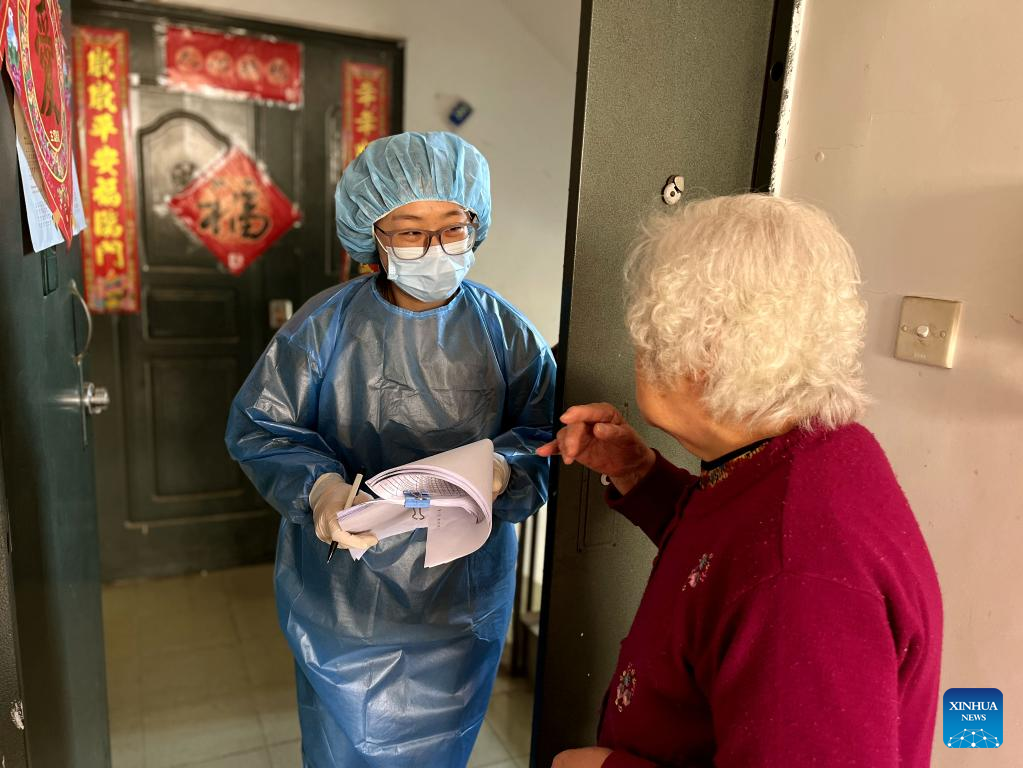Volunteers help lonely seniors during lockdown in Shanghai


As Shanghai, a megacity with a population of 25 million, remains under lockdown to combat a fierce outbreak of COVID-19, many seniors living alone have proven to be the most vulnerable.
With their normal lives disrupted by the epidemic, the seniors are encountering various difficulties: some find it hard to access daily necessities via online shopping as they don't know how to use smartphones; some are seeing their medicines run out; and some are gripped by fears due to poor knowledge of the outbreak.
In 2020, Shanghai was home to 5.8 million people aged 60 or above, accounting for 23.4 percent of the population. Among them, more than 300,000 live alone.
At such a difficult time, many people have reached out to them. Here are some people interviewed by Meiri Renwu, a public account on WeChat.
Tech lessons
Wang Ye, who is in his mid-20s and works in the education sector, has been living under lockdown since March 22 after one positive case was detected in the residential community he lives in.
There are 10 households with seniors living alone in his building. As many elderly people don't have the habit of stocking up on food, most of them ran out in only two or three days and had to wait for government supplies, he said.
To secure enough food, community residents resorted to online group-buying for groceries and necessities. But the group-buying process, usually conducted through a WeChat group, has proven to be complicated for seniors.
"Collection of orders, making payment and picking up stuff, there are too many steps in the group-buying process. If you miss a step, you fall behind. It is not easy for many young people, let alone the elderly," Wang said.
Wang and other volunteers put up a notice at the entrance of the building to allow people in need to contact them to join the group-buying activity, and helped many elderly people order the food they required.
"Some elderly people don't know how to change their name in the WeChat group to their floor number and house number, and some did not realize that they hadn't activated the payment function in WeChat when they needed to make the payment," Wang said.
Calls for assistance
After the latest epidemic hit Shanghai, Xu Yixing, a media professional in his early 20s, joined a WeChat group that offers assistance to those in need of medical services.
Xu said many of those seeking help are seniors who have chronic underlying conditions, such as diabetes and hypertension. When their medicines run out, they are not able to go out to buy them due to the lockdown, and also buying through online delivery services can be difficult.
"Many elderly people have not heard of Meituan or FlashEx (two online delivery platforms), or online medical services. And for many of those aged 60 or above, the only function of a smartphone they know how to use is sending messages on WeChat, and for those above 75, even that is difficult," Xu said.
Xu and his friends teach such seniors to buy medicines online or help them contact online hospitals.
In one case, an elderly man with uremia required hemodialysis. Xu and other volunteers first helped him get permission from the local residential neighborhood committee to allow him to go out. Then they helped hail a taxi to send him to hospital.
As the elderly man lives in the Pudong area, east of the Huangpu River, and the hospital is in Puxi, west of the river-two areas that are under different lockdown rules-the taxi had to turn around at the crossing point, where the man was transferred to another car and sent to the hospital. And it was the same for the trip back.
"It was a grueling experience for him," said Xu.
Xu said once seniors have developed a sense of trust in volunteers, they would ask the young people many questions like whether the novel coronavirus can be transmitted through the toilet, or whether the virus can spread into the room through the window.
Reaching out
Zhang Huijuan, 60, is a volunteer of a local program that allows younger seniors aged 50 to 69 to help those older than 70.
Under the project, a volunteer visits the elderly people who live alone once every two weeks, and calls them once a week.
Zhang said the epidemic has worsened loneliness among seniors in the city.
"To alleviate the loneliness, many elderly people turn on the TV, just for some comfort from the sound it makes," she said. "Many elderly people are eager to find a 'receptive ear'.
"Usually once a phone conversation starts, their words pour out. They like to talk about their children or their retirement lives. Sometimes, they might repeat the same thing again and again and forget they have already said that."
Zhang said the elderly in his neighborhood have been well cared for during the lockdown with volunteers regularly sending meals and medicines to their homes, largely thanks to the close bonds established between volunteers and the seniors before the epidemic.
"Everyone will become old one day. I am 60 and today I can help. But someday, I will need help," said Zhang.




































